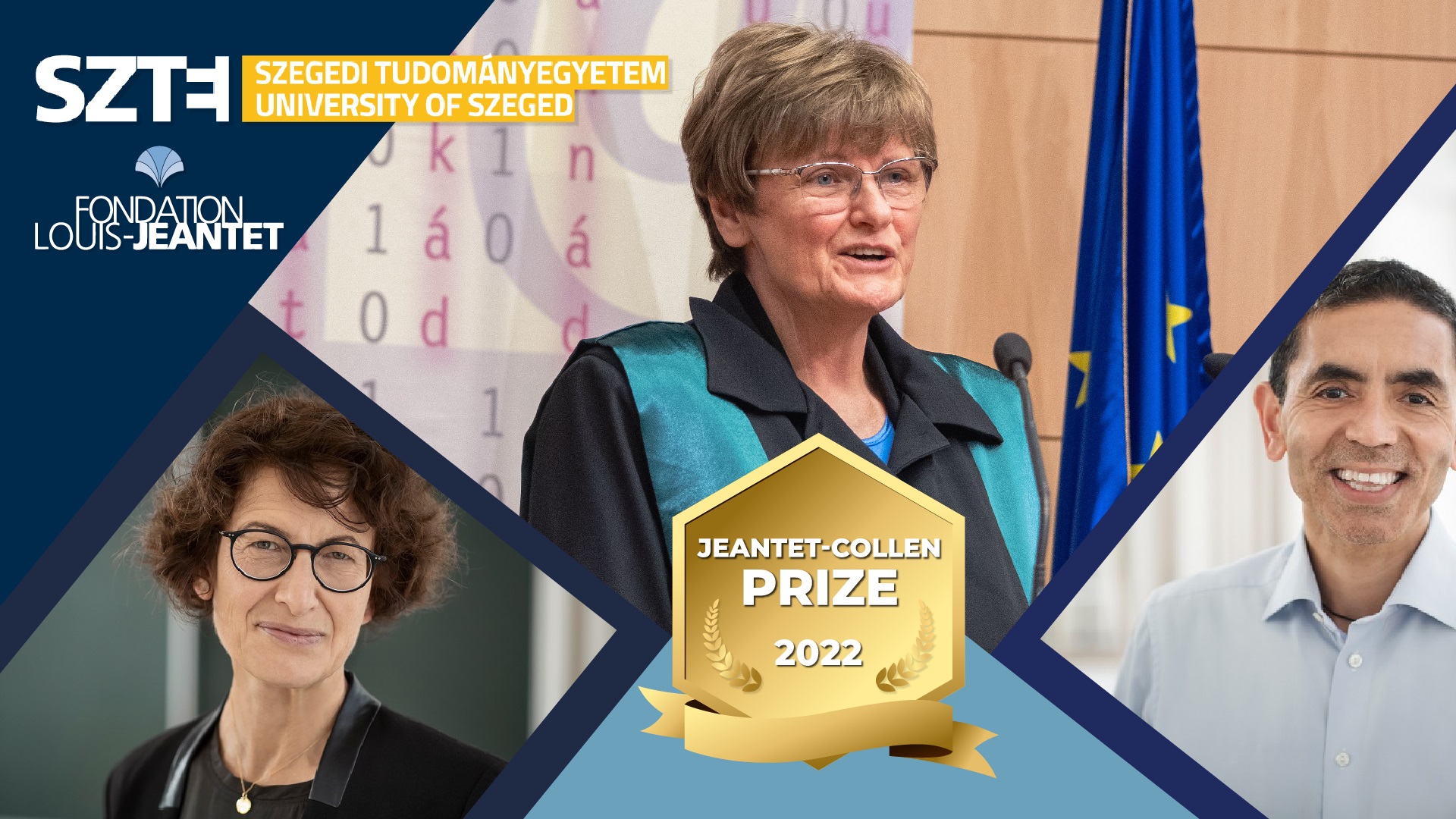
Katalin Karikó, Professor at the University of Szeged and Vice President of BioNTech, along with Uğur Şahin and Özlem Türeci, who co-founded the German company and are also professors at the University of Mainz, will be awarded the 2022 Jeantet-Collen Prize for Translational Medicine. The Swiss award for the three researchers, who contributed to the development of mRNA-based vaccines, is Europe's best-funded prize and encourages them to continue their innovation project. Katalin Karikó, professor at the University of Szeged, will use the grant to fund her future research at the University of Szeged.
"The 2022 Jeantet-Collen Prize for Translational Medicine will be shared between Katalin Karikó from Hungary and Uğur Şahin and Özlem Türeci from Germany."- The Louis-Jeantet Foundation announced on the morning of 30 November 2021 in Geneva. - "For the design and development of mRNA-based vaccines that safely protect humankind against the deadly SARS-CoV-2 virus". - The Foundation's press release also explains the background and vision of the three researchers.
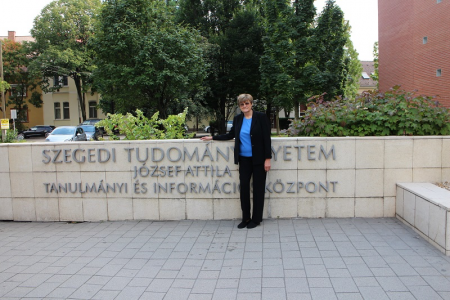
Three Researchers- One Company
The research trio Kariko - Şahin - Türeci has been working together for eight years. Katalin Karikó, who holds a degree in biology and a doctorate in biochemistry from the University of Szeged and has been researching the medical applications of mRNA in her US academic career, joined BioNTech in 2013. The co-founders of the company are Uğur Şahin, a medical graduate from the University of Cologne in Germany, and Özlem Türeci, a medical student at Saarland University in Homburg.
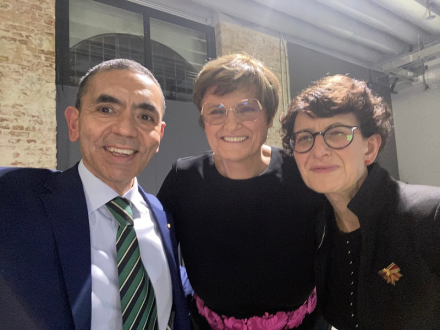
“The result of the research into therapeutic messenger RNA is the spectacularly rapid development of a highly effective vaccine against a "new type" of coronavirus. This played a crucial role in the worldwide containment of the COVID-19 pandemic. Their work will have an unparalleled impact on the development of future vaccines against pathogens and cancer cells." - Summarised the results of the three researchers' joint work in a statement from the Louis-Jeantet Foundation.
The three leaders of the Mainz-based biotechnology company will not only maintain but also expand their links with basic research and universities. Katalin Karikó, Senior Vice President of BioNTech, has been a professor at the University of Szeged since 2021. The co-founders of the company - CEO Uğur Şahin and Medical Director Özlem Türeci - are professors at the University of Mainz.
Each researcher will receive a grant of 150,000 Swiss francs - nearly 53 million forints - for their work. Katalin Karikó, professor at the University of Szeged, will use this grant to fund her future research at the University of Szeged. The Jeantet-Collen Prize will be awarded on 11 October 2022.
Potentials of Messenger Molecules
How are traditional vaccines made? These vaccines are protein-based, meaning that a detoxified or weakened virus is used to achieve the immune reaction. The mass production as well as the weakening and protein extracting methods require both time and resources.
With the COVID-19 pandemic the entire world that the ‘mRNA’ abbreviation stands for ‘messenger RNA’.
What is mRNA good for? “mRNAs are messenger molecules that carry the genetic information encoded by DNA, found in the nucleus, to the protein making machinery which is found in the cytoplasm of the cell. Here the RNA messages are read and translated into fully functional proteins which will carry out the many tasks needed for a functioning cell.
Each specific mRNA codes a specific protein.” - Stated in the press release of the Louis-Jeantet Foundation. However, “mRNAs are unstable molecules and exogenous mRNAs produce immune reactions and are destroyed before being taken up by our cells.”
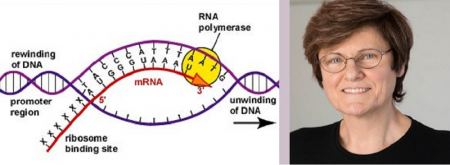
How did Katalin Karikó ’tame’ mRNA to enable its utilization in medical therapy? She “investigated RNA-mediated immune activation and discovered that making specific modifications to the nucleosides in the mRNA could suppress the body's own inflammatory response against the synthetic mRNA.” She managed to prove this with experiments she concluded with her fellow researcher Drew Weissman. At the beginning of the pandemic the discovery linked to the University of Pennsylvania served as a basis of the quick production of the first mRNA base vaccines to contain the novel coronavirus.
What more is mRNA capable of? Uğur Şahin and Özlem Türeci are interested in making mRNA-based medicine for individualized immunotherapy against cancer. With Katalin Karikó „they developed methods for delivering mRNA to dendritic cells using a suitable lipid carrier; they enhanced their stability; and they increased the level of protein translation.” Their work “has proven the potential of mRNA as a new drug class.”
Constant Innovation
The Kariko - Şahin - Türeci research trio will use the Jeantet-Collen Prize to support and further deepen their research on mRNA-based vaccines and immunotherapies. The scientists are also encouraged to continue with their successful project by the conditions attached to the Louis-Jeantet Foundation awards.
The Louis-Jeantet Prizes, established in 1986, are open to biomedical researchers from a Council of Europe Member State. "If the scientific result awarded is close to a practical application in the fight against diseases affecting humanity, one of the Louis-Jeantet Prizes will become the Jeantet-Collen Prize for Translational Medicine, supported by donations from the Désiré Collen Stichting." - Explains the Foundation's award leaflet.
The Louis-Jeantet Prizes are the most endowed European prizes. Each comes with a prize of 500,000 Swiss francs - nearly 176 million forints. But only 10 percent of this goes to the scientist personally. 90% of the grant must be used to fund his or her ongoing research thus encourages the continuation of an innovative research project, in addition to recognising the work carried out by cutting-edge researchers.
To date, the Louis-Jeantet Foundation has given a total of more than 60 million Swiss francs for the prizes it manages.
The 100th Laureate
The Louis-Jeantet Foundation was established in 1983 at the request of the eponymous French businessman from Geneva. The aim is to promote the development of medicine while protecting the role and identity of European biomedical research in international competition. The Foundation funds the Louis-Jeantet Prize for Medicine and several professorships at the University of Geneva Faculty of Medicine and Institute of Global Health.
Among the researchers so recognised since 1986 is Botond Roska, of Hungarian nationality, who was honoured in 2019 and is the founding director of the Institute for Molecular and Clinical Opthalmology Basel in Switzerland. The list includes - among others - the Nobel Prize winner Bert Sakmann, who has a close working relationship with the University of Szeged. The German physiologist became involved in the talent management programmes of the University of Szeged as a result of the large-scale conference held on the occasion of the 75th anniversary of Albert Szent-Györgyi’s Nobel Prize and his experiences in Szeged. Nobel Prize-winning molecular biologist Sir Gregory Paul Winter, whom Katalin Karikó met on this year’s lecture circuit in Cambridge, won the Swiss prize in 1989.
The Louis-Jeantet Prize, in its 36th year of existence, will be awarded to the 100th experienced scientist in 2022. The Louis-Jeantet Prize for Medicine will also be awarded to Carol Robinson, Professor of Chemistry at the University of Oxford, alongside the Jeantet-Collen Prize for Translational Medicine winners Katalin Karikó, Uğur Şahin and Özlem Türeci.
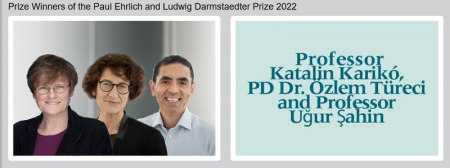
Kariko, Uğur and Türeci have received several joint awards. Such as, they have been awarded, among others, the 2022 Paul Ehrilch and Ludwig Darmstaedler Prize, the Princess of Asturias Award and most recently the German Future Prize.
Of the 100 researchers awarded one of the Louis-Jeantet prizes, 14 have gone on to win the Nobel Prize…
SZTEinfo – Ilona Újszászi
Source: Louis-Jeantet Foundation
Article translated by: ZS.P., R.SZ., D.M.
More information about Katalin Karikó, Professor at the University of Szeged is available on the website of the SZTE Klebelsberg Library.

